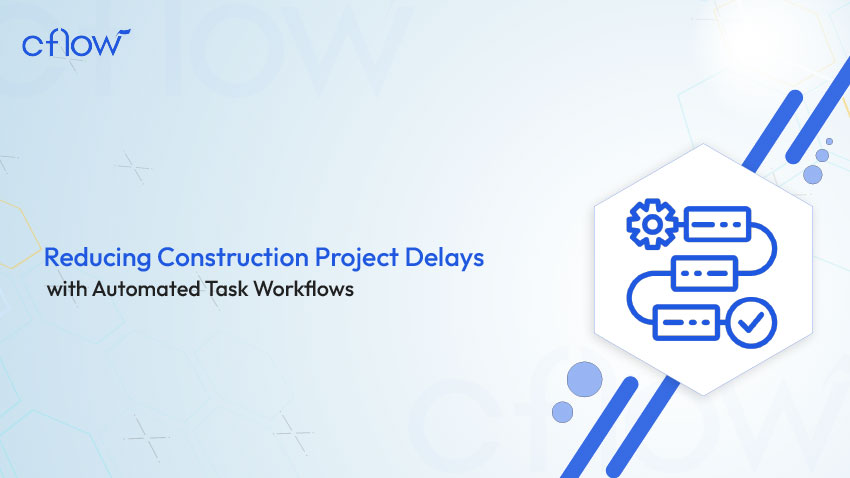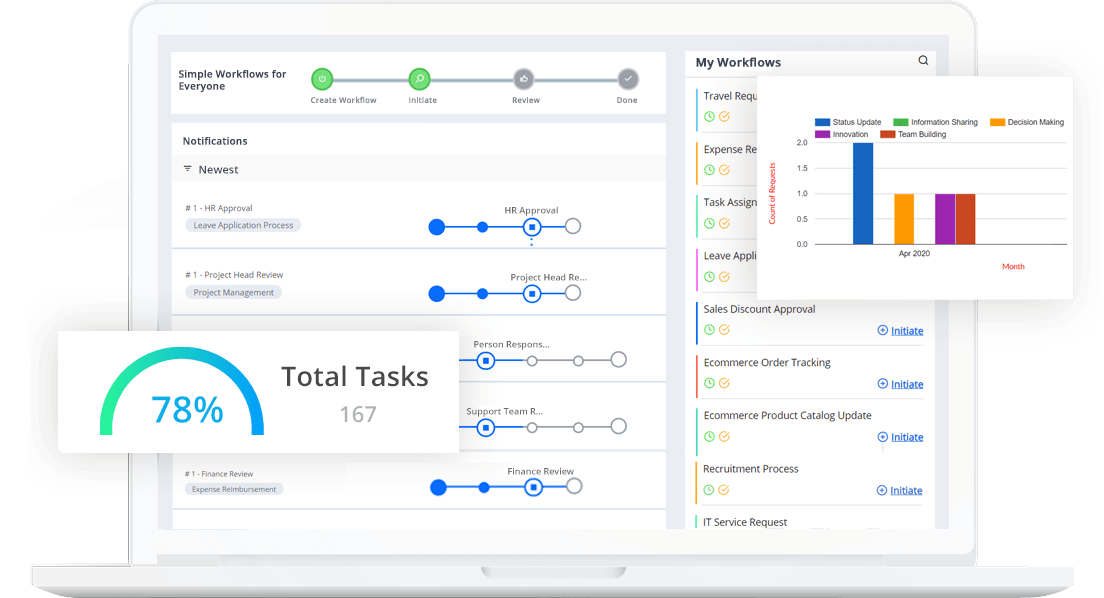Reducing Construction Project Delays with Automated Task Workflows

Key takeaways
- Construction project delays are caused by inefficiencies, miscommunication, and manual task management.
- Automated task workflows streamline project coordination, reducing bottlenecks and improving efficiency.
- Common causes of delays include labor shortages, poor planning, and regulatory hurdles.
- Implementing workflow automation helps in tracking progress, automating approvals, and ensuring compliance.
- Cflow optimizes construction workflows by automating document approvals, resource allocation, and task assignments.
- Using automation improves collaboration, minimizes errors, and enhances project timelines.
Delays in construction projects are a major challenge that impacts budgets, deadlines, and overall efficiency. Project managers often face setbacks due to poor communication, labor shortages, unforeseen changes, and inefficient task management. These delays not only increase costs but also affect stakeholder confidence and project success.
Automated task workflows provide a solution by streamlining processes, improving coordination, and ensuring timely task execution. By leveraging workflow automation, construction firms can reduce manual intervention, optimize project timelines, and mitigate common causes of delays. This blog explores the causes of construction project delays, methods to avoid them, and how automation, particularly with platforms like Cflow, can enhance workflow efficiency.
Table of Contents
Common Causes of Delay in Construction Projects
Construction projects are complex endeavors that require careful coordination of various elements, including workforce, materials, regulations, and technology. Delays in construction projects can have severe consequences, including cost overruns, project inefficiencies, and strained relationships with stakeholders. Understanding the root causes of these delays is essential to implementing effective solutions. Below are some of the most common reasons construction projects get delayed:
Labor Shortages
A lack of skilled workers can significantly impact project timelines. Many construction sites struggle to find qualified labor, leading to slower progress and missed deadlines. As older professionals retire and fewer young workers enter the construction industry, labor shortages continue to be a growing concern. Without adequate staffing, tasks such as framing, electrical work, and inspections take longer to complete, delaying the entire project.
Poor Planning and Scheduling
Inadequate planning at the start of a project can lead to disorganized workflows and unforeseen obstacles. Poor scheduling affects material procurement, workforce availability, and task execution, ultimately slowing down progress. Many construction firms still rely on manual project scheduling, which is prone to human error. Without a well-structured timeline, tasks may overlap inefficiently, leading to idle time and resource misallocation.
Regulatory and Compliance Issues
Construction projects must comply with numerous regulations, including building codes, zoning laws, safety standards, and environmental guidelines. Delays often occur when companies fail to secure necessary permits on time or encounter unexpected compliance issues. Regulatory inspections can also stall progress if a project does not meet safety or quality standards, requiring additional modifications before moving forward.
Communication Breakdowns
Clear and effective communication is critical to keeping construction projects on track. When teams, subcontractors, or suppliers do not have access to real-time project updates, misunderstandings and errors can occur. Poor communication leads to incorrect execution of tasks, rework, and scheduling conflicts. This issue is especially prevalent in large-scale construction projects involving multiple stakeholders who rely on seamless coordination.
Budget Overruns
Many construction projects exceed their initial budget due to poor cost estimation, unexpected price increases, or misallocation of resources. Insufficient financial planning can lead to delays when funds run out before the project is completed. Additionally, hidden costs such as labor overtime, material wastage, and penalty fees for late delivery can further extend project timelines if not managed effectively.
Weather and Unforeseen Events
External factors such as extreme weather conditions, supplier delays, or sudden design changes can disrupt construction schedules. Rain, snow, high winds, or heat waves can halt outdoor work, causing significant setbacks. Similarly, supply chain disruptions—such as delayed deliveries of raw materials or equipment—can impact timelines. Unanticipated design changes made after construction has started can also lead to major delays as teams adjust plans and reschedule tasks.
By recognizing these challenges, construction companies can implement proactive strategies, such as workflow automation, real-time monitoring, and predictive scheduling, to minimize delays and optimize project execution.
Construction projects can be delayed due to various reasons, including:
- Labor Shortages: A lack of skilled workers can lead to slower progress and missed deadlines.
- Poor Planning and Scheduling: Inadequate project planning can result in delays in material procurement and task execution.
- Regulatory and Compliance Issues: Permits, safety regulations, and compliance requirements can cause unexpected hold-ups.
- Communication Breakdowns: Ineffective communication among teams leads to misunderstandings and rework.
- Budget Overruns: Insufficient budget allocation can lead to halted projects due to a lack of resources.
- Weather and Unforeseen Events: Natural disasters, supplier delays, or unexpected changes can impact progress.
How to Avoid Delays in Construction Projects
Construction project delays can be mitigated by implementing strategic planning, efficient resource management, and modern workflow automation. Below are key strategies to prevent project delays and keep construction work on track:
1. Implement Advanced Planning and Scheduling
Proper planning and scheduling are essential for ensuring that construction projects progress smoothly. Using digital project management tools, construction teams can create detailed schedules that outline each phase of the project. Automated scheduling software helps in tracking task dependencies, workforce availability, and material delivery timelines, ensuring that no phase is delayed due to poor foresight. Additionally, project managers can set up real-time alerts and automated updates to keep all stakeholders informed of progress and potential risks.
2. Improve Communication and Collaboration
Effective communication between contractors, architects, suppliers, and project managers is crucial for avoiding misunderstandings and unnecessary rework. Cloud-based collaboration tools allow all stakeholders to access project updates in real time. Automated notifications and workflow approvals ensure that everyone involved stays informed about schedule changes, approvals, and modifications. This reduces the risk of costly errors caused by miscommunication or lack of information.
3. Streamline Compliance and Approvals
Regulatory compliance is a significant factor in construction delays, especially when permits and safety inspections are required. Automating the approval process ensures that all necessary documents, such as permits, safety certifications, and design approvals, are processed in a timely manner. Automated workflows prevent bottlenecks by ensuring that the required documentation is submitted, reviewed, and approved without unnecessary delays.
4. Optimize Resource Allocation
A well-balanced allocation of resources, including labor, materials, and equipment, is critical for preventing project delays. Automated task workflows help assign work based on project priorities and workforce availability, reducing downtime and maximizing productivity. AI-driven tools can analyze project demands and predict material shortages, ensuring that procurement processes are initiated in advance to avoid delays.
5. Monitor Progress with Real-Time Data
Tracking project performance through AI-driven analytics and real-time reporting tools allows construction managers to identify bottlenecks early. Automated dashboards provide insights into project status, budget adherence, and workflow efficiency. By continuously monitoring performance and making data-driven decisions, construction companies can identify risks before they become major obstacles, ensuring that the project stays on schedule.
By leveraging these strategies, construction firms can significantly reduce project delays, enhance efficiency, and improve overall project execution.
Key Statistics on Construction Projects
A KPMG report states that only 25% of construction projects came within 10% of their original deadlines in the past 3 years.
A McKinsey report reveals that the Construction Industry performs poorly on completing megaprojects on time, on budget, and to specifications.
A 2021 survey report reveals that all identified causes for construction project delays are correlated to supply management, workforce management, poor planning, and climatic and environmental conditions.
Construction Tasks that Can be Automated
Automating various tasks in construction projects helps streamline operations, reduce errors, and improve overall efficiency. The following are key construction tasks that can benefit from automation:
1. Project Scheduling
Construction projects involve multiple stakeholders, timelines, and dependencies, making scheduling a critical aspect of project success. Automated scheduling tools help track progress, adjust timelines in real-time, and allocate resources effectively. AI-driven scheduling ensures that delays are minimized by analyzing historical project data and predicting potential disruptions before they occur.
2. Document Management
Construction projects require extensive documentation, including contracts, permits, compliance reports, and blueprints. Automating document management reduces approval delays, improves compliance tracking, and ensures that all project-related documents are securely stored and easily accessible. This eliminates the need for manual paperwork, reducing the risk of lost or outdated documents.
3. Task Assignments
Managing workforce tasks manually can lead to inefficiencies and missed deadlines. AI-powered workflow automation tools assign tasks based on worker availability, skill levels, and project requirements. Automated task workflows also provide real-time updates and alerts, ensuring that everyone involved is aware of their responsibilities and timelines.
4. Site Inspections
Construction site inspections are necessary to maintain safety and quality standards. Automated quality control workflows use AI-powered checklists and real-time monitoring to ensure that every stage of the project meets regulatory standards. Automation eliminates the need for manual reporting and ensures immediate corrective actions are taken when deviations are detected.
5. Billing and Invoicing
Delays in payments can disrupt project timelines and create disputes between contractors and clients. Automated financial workflows help process invoices faster, ensure timely payments, and reduce errors in billing. Automation also integrates with accounting software to provide real-time financial tracking and compliance monitoring.
By automating these tasks, construction firms can significantly enhance efficiency, reduce human errors, and ensure that projects are completed on time and within budget.
How to Implement Workflow Automation in Construction Projects?
Construction workflow automation enhances efficiency by eliminating manual delays, reducing human error, and streamlining approvals. Implementing automation requires careful planning and execution to ensure seamless integration with existing processes. Below are key steps to successfully implement workflow automation in construction projects:
1. Identify Key Areas for Automation
Before implementing automation, construction managers must assess manual processes that cause delays, such as document approvals, scheduling, and compliance tracking. Identifying bottlenecks and repetitive tasks allows businesses to prioritize automation where it will have the most significant impact. For example, automating permit approvals and resource allocation can significantly speed up project execution and reduce downtime.
2. Choose the Right Automation Platform
Selecting an automation tool that integrates seamlessly with project management software is crucial. The chosen platform should offer features like task tracking, document management, automated notifications, and real-time reporting. A scalable automation solution ensures that workflows can adapt to project complexities and future growth. Platforms like Cflow provide customizable workflows, making it easier to align automation with specific construction requirements.
3. Set Up Standardized Workflows
To maximize efficiency, standardized rules and approvals should be established for repetitive tasks. This includes defining clear approval hierarchies for document submissions, change orders, and compliance checks. Standardized workflows ensure consistency across projects, prevent unauthorized changes, and help maintain regulatory compliance. Automated routing eliminates unnecessary delays and improves project transparency.
4. Train Teams on Automation Tools
For successful implementation, employees and project managers need proper training on how to use workflow automation tools effectively. Teams should understand how to manage automated approvals, track project progress, and utilize real-time alerts. Training programs should focus on reducing resistance to automation and demonstrating how these tools simplify workload management.
5. Monitor and Optimize Performance
Automation is not a one-time implementation; continuous monitoring is required to optimize workflows. Real-time analytics and reporting dashboards provide valuable insights into task progress, identifying inefficiencies that need improvement. Project managers can use this data to refine workflows, address bottlenecks, and ensure that automation continues to drive higher efficiency and project success.
By following these steps, construction firms can seamlessly integrate workflow automation into their operations, leading to faster project completion, reduced costs, and improved coordination across teams.
End-to-end workflow automation
Build fully-customizable, no code process workflows in a jiffy.
How Cflow Automates Construction Project Workflows?
Cflow is a powerful workflow automation platform designed to streamline construction project management by automating manual processes, reducing inefficiencies, and improving overall project execution. By integrating automation into various aspects of construction workflows, Cflow ensures better task coordination, faster approvals, and real-time tracking of project milestones. Below are some key features that make Cflow an ideal choice for construction workflow automation:
1. Automated Task Assignments
Construction projects involve multiple tasks that need to be allocated to the right team members efficiently. Cflow automates task assignments based on workload, project priorities, and skill availability. This reduces delays caused by manual task allocation and ensures accountability across teams. Automated workflows send real-time notifications to assigned personnel, ensuring that tasks are completed on time without unnecessary follow-ups.
2. Approval Workflow Automation
Approvals for permits, change orders, and compliance documents can be time-consuming when done manually. Cflow automates approval workflows, reducing the back-and-forth between project stakeholders. Automated routing ensures that approval requests reach the right personnel immediately, eliminating unnecessary delays. This is particularly useful for handling compliance documentation, contract approvals, and supplier verification processes.
3. Resource Management Optimization
Efficient allocation of materials, labor, and equipment is critical to keeping a construction project on schedule. Cflow automates resource allocation, ensuring that materials are available at the right time, workers are assigned tasks efficiently, and equipment usage is optimized. Automated inventory tracking helps project managers avoid shortages or excess stockpiling, reducing wastage and costs.
4. Integration with Project Management Software
Construction firms often rely on multiple software solutions, such as Microsoft Project, Procore, and ERP systems, for project planning and execution. Cflow integrates seamlessly with these platforms, allowing businesses to automate approvals, synchronize project timelines, and track financial data without manual intervention. This integration ensures that all teams work with up-to-date, real-time information, enhancing overall coordination and efficiency.
5. Real-Time Monitoring and Analytics
Tracking project progress in real-time is essential for identifying potential delays and making informed decisions. Cflow provides real-time dashboards and analytics that allow project managers to monitor ongoing tasks, pending approvals, and overall project performance. With AI-driven insights, construction companies can predict bottlenecks, adjust schedules, and optimize resource allocation proactively, minimizing disruptions and ensuring projects are delivered on time.
By leveraging Cflow’s workflow automation capabilities, construction firms can reduce project delays, streamline operations, and enhance collaboration between teams. Automating repetitive tasks and approvals eliminates inefficiencies, allowing managers to focus on strategic project execution.
Final Thoughts
Construction project delays can be costly and disruptive, but implementing automated task workflows can significantly improve efficiency. By streamlining scheduling, approvals, and communication, automation minimizes delays and enhances project delivery. Cflow offers a robust solution for automating construction workflows, helping project managers maintain control and optimize operations.
Reduce project delays and streamline workflows with Cflow today!
FAQs
- What are the main causes of construction project delays?
Delays are often caused by labor shortages, poor planning, compliance issues, communication gaps, and weather disruptions. - How does automation help reduce delays in construction projects?
Automation streamlines scheduling, approvals, task assignments, and documentation, improving overall project efficiency. - Which construction tasks can be automated?
Tasks such as scheduling, document approvals, site inspections, invoicing, and resource management can be automated. - What is the best way to implement workflow automation in construction?
Start by identifying inefficiencies, selecting the right automation tool, standardizing workflows, training employees, and tracking performance. - How does Cflow improve construction project workflows?
Cflow automates task assignments, approvals, resource allocation, and compliance tracking, ensuring smoother project execution. - Can automation integrate with existing project management software?
Yes, automation platforms like Cflow integrate with tools such as Microsoft Project, Procore, and ERP systems for seamless workflow management.
What should you do next?
Thanks for reading till the end. Here are 3 ways we can help you automate your business:

Do better workflow automation with Cflow
Create workflows with multiple steps, parallel reviewals. auto approvals, public forms, etc. to save time and cost.

Talk to a workflow expert
Get a 30-min. free consultation with our Workflow expert to optimize your daily tasks.

Get smarter with our workflow resources
Explore our workflow automation blogs, ebooks, and other resources to master workflow automation.
What would you like to do next?
Automate your workflows with our Cflow experts.



